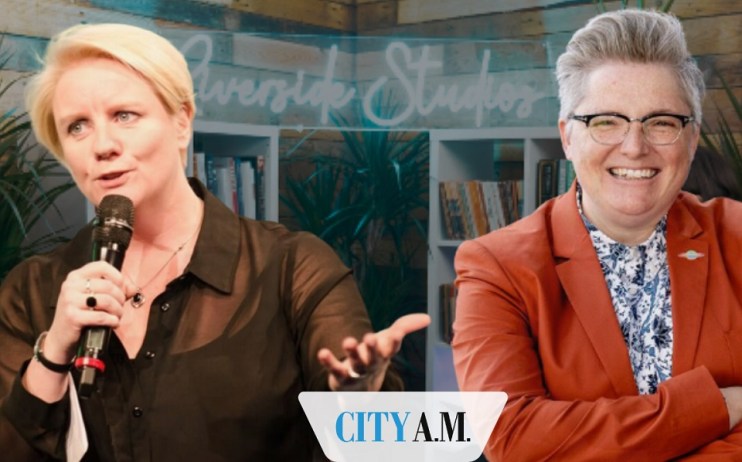London Pride Month: LGBTQ business leaders on being closeted in the City

In the aftermath of London Pride Month, City A.M. hears from top City of London CEOs about being closested -and out – in the City, as well as the ways all of us can be better allies. You can watch our video series on YouTube
For many City of London workers, being LGBTQ still means facing daily challenges. Instances of homophobic hate crimes are rising in the UK, and in America, so although it can seem like things have got better, it’s important to remember that for some, that’s not the case.
City A.M. sat down with two senior City of London bosses, Julia Streets, CEO of Streets Consulting, and Lou Smith, founder and chair of Innovate Finance and CEO of TechPassport, to hear their stories about being closeted, and coming out, in the City. We also discuss being an ally: why speaking out in support of LGBTQ colleagues is so crucial.
Both women started working in London over 30 years ago when the City of London was a more hostile place. “I had very clear strategies about how to avoid being asked one question, which was ‘what did you do at the weekend’?” says Streets.
“I would not go into the kitchen at the office until after lunchtime to avoid being asked that question, by the kettle, for fear of coming out.
“It was hard work. I spent a lot of time very actively mindful of how I talked about myself and my life and the truth was I put up boundaries and walls and barriers. That’s very contrary to who I am. I’m a very open soul, a very open human being. It takes an extraordinary amount of effort to do that, day after day.
Research shows that being able to be yourself at work means that you’ll likely perform better, too, a theory Streets identifies with. “There are employees who are wasting time and energy projecting their characteristics when we should be supporting who they are and how they identify,” says Streets. “We always look at it through a commercial lens. The greater opportunities that diversity and inclusion can bring to your company.”
Watch our full interview with Julia Streets, CEO of Streets Consulting, below.
It took me until 25 to identify as gay at work, and probably with my family as well, and that was probably because of fear. Fear I think is quite debilitating, in a social sense as well as your work sense because you’re pretending to be something you’re not
Lou Smith, Innovate Finance
So what can companies and straight allies do to help? Streets says in our interview that listening is essential for allyship. “Come out and advocate for those not in the room, and look at your peers, say you should step up as an ally too. Go to your employee resource groups, the LGBTQ networks within your company, and listen.”
Lou Smith also started working in the City in the nineties and found a similar lack of representation. “When I first went into Financial Services there were very few people you could look at and go, ‘Oh, they’re like me,'” she says. “It took me until 25 to identify as gay at work, and probably with my family as well, and that was probably because of fear. Fear I think is quite debilitating, in a social sense as well as your work sense because you’re pretending to be something you’re not.”
“I had a pretend boyfriend called Dave who was actually a six foot two South African woman called Jenny.”
For Smith, allyship is when employees have the strength to “walk out when it’s not right,” helping to protect LGBTQ people even in the toughest situations, not just in Pride Month but all year round. “Do you stand there when the challenges are there, do you stand when it’s hard, and do you stand up, stand out and walk out sometimes when it’s not right? Allyship means to walk with me three hundred and sixty five days a year, not just June.”
Never be afraid to ask LGBTQ people to gain more information on the challenges and nuances of queer culture, says Smith. “I never have any issues with people having conversations about what matters to me. People will ask what my pronouns are, and I think if June starts those conversations then brilliant.”
“Allies are so critical and the more we have conversations, the more allies we have as fundamentally you tolerate what you walk past. It might be walking the Pride Parade, it might just be having a coffee, or a tea, or a glass of wine or a mocktail at the end of the day and going, ‘how is it? what is it like?’ If you create fearless spaces people do incredible things. If you create a space where people say ‘I can be me,’ you put that together with other people who can be everything about who they are, and you can create incredible things.”
Smith agrees with Streets that helping people celebrate their true identities in the workplace will foster a better working environment – and produce better work, and higher margins, too. “I work in the innovation industry with the innovators and disruptors. Their sole purpose is creative innovation and disruption, so that means we need to do things differently, think differently, focus differently, you can only do that if people come as they are. So as leaders our job is to create those spaces.”
Watch our full-length LGBTQ+ interviews with Julia Streets and Lou Smith on our YouTube channel
Read more: Pride Month 2023 in London: Where to go and what to do
Read more: LGBT History Month: Things to do in London to celebrate and educate
